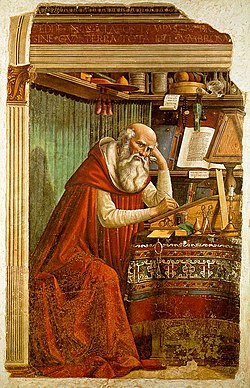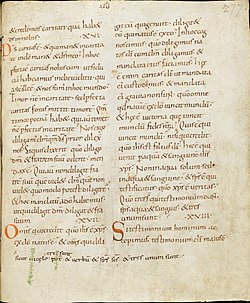Course:Carey HIST501/Project 2/Jerome
Appearance
A short (14min) video summary of St. Jerome
Year of birth and death
- Born: 342-347 AD
- Died on 30 September 420 AD
- Died when approximately 73–78
Short biographical sketch of St. Jerome
- a. Upbringing:
- Jerome (Latin name: Eusebius Sophronius Hieronymus) was born at Stridon
- Roman province of Dalmatia
- The exact location of Stridon is unknown, but it is believed to be near either modern day Croatia, or "Bosnia and Herzegovina".
- Another source suggested that he was born in territory now in northwest Yugoslavia (modern Serbia) [1]
- Jerome (Latin name: Eusebius Sophronius Hieronymus) was born at Stridon
- b. Education
- Pursued rhetorical and philosophical studies in Rome, in preparation for a career in law, which he did not pursue. [1]
- Studied under the grammarian Aelius Donatus.
- Mainly in Latin, but possibly some Greek.
- c. Journey of Faith
- Engaged in the superficial escapades and sexual experimentation of students in Rome
- Indulged himself quite casually
- Very guilty afterwards
- To appease his conscience, on Sundays he visited the catacombs
- He became a Christian in Rome after initially skeptical about it.
- Baptized in 366 AD, probably by Pope Liberius.[2]
- He later went to Antioch and had a vision during one of his illnesses (Winter of 373–374)
- The vision led him to set aside his secular studies and devote himself to God.
- His two consuming interests: scriptural studies and the pursuit of Christian asceticism.[1]
- Jerome went for a time to the desert of Chalcis (SE of Antioch) because of his desired for a life of ascetic penance.
- He joined a colony of Christian hermits in this desert in late 375 CE.[3]
- He spent time studying and write during this period
- He learned Hebrew from a converted Jew

- In around 385AD, he left Rome, and Jerome (along with some virgins led by Paula) went for a pilgrimage through Palestine and Egypt.
- In 386AD, he settled in Bethlehem
- By 389 AD, Paula finished a monastery for men under Jerome's direction,
- Engaged in the superficial escapades and sexual experimentation of students in Rome
- d. Influential person(s)
- For a time, he was studying the bible in depth, under the influence of Apollinaris of Laodicea.
- He indulges in allegorical and mystical subtleties after the manner of Philo and the Alexandrian school.
- e. Vocational path
- Returned to Antioch in 378 from desert of Chalcis
- Ordained there by Bishop Paulinus
- Attended the exegetical lectures of Appollinaris of Laodicea
- Visited the Nazarenes of Beroea to examine their copy of a Hebrew gospel.
- He helped with the establishment of a papal library in Rome[3]
- Ordained there by Bishop Paulinus
- Soon after, went to Constantinople to pursue a study of Scripture under Gregory Nazianzen (~2 years)
- Went to Rome, became the secretary to Pope Damasus I
- As protege of the pope Damasus, he was given various duties related to scripture revision, updates and translations, setting the path to what became his most important achievement (Translation of the Latin Bible known as the Vulgate)
- Got to know St. Gregory of Nyssa and theologian Amphilochius of Iconium at the council of Constantinople (381)
- Improved his knowledge of Greek
- Developed admiration of Origen's exegesis
- Returned to Antioch in 378 from desert of Chalcis
Major contributions of St. Jerome:
- a. Contributions to doctrinal development
- Use polemical styled writings to direct against assailants of the orthodox doctrines.
- Translation of the treatise of Didymus the Blind on the Holy Spirit into Latin
- Shows an apologetic tendency against the Arians and Pneumatomachoi.
- Two letters to Pope Damasus (15 and 16) complain of conducts by Meletians and Paulinians regarding the use of the terms ousia and hypostasis
- In 379AD, he composed "Liber Contra Luciferianos" to combat the heresies related to the rejection of baptism
- In 383AD, he wrote a treatise to counter the teaching of Helvidius regarding the "Perpetual virginity of Mary".
- Translation of the treatise of Didymus the Blind on the Holy Spirit into Latin
- Considered a doctor of the church[4], which in Roman Catholicism, means any of the 36 saints whose doctrinal writings have special authority.[2]
- Use polemical styled writings to direct against assailants of the orthodox doctrines.
- b. Contributions to pastoral work
- Ordained by Bishop Paulinus in Antioch in 378
- When he worked as secretary to Pope Damasus I in Rome for 3 years (382-385), he was also responsible in leading Roman Christians.
- But he was mainly recognized as the patron saint of translators, librarians and encyclopedists.
- c. Contributions to Christian ethics
- Known for his teachings on Christian moral life
- Especially for people living in big city like Rome
- Focus on how women devoted to Jesus should live their lives.
- Held classes for a monastic-minded circle of noble Roman widows and virgins
- Taught them the Hebrew text of the Psalms
- Answered their biblical problems
- Became their mentor in spirituality
- Known for his teachings on Christian moral life
- d. Major works written
- He is best known for his translation of most of the Bible into Latin (aka Vulgate) and his commentaries on the whole Bible.
- Translated 14 of Origen's homilies (sermons) on OT books into Latin
- Translated church historian Eusebius's Chronicon (Chronicles) until year 378.
- Translated two sermons of Origen on the Song of Solomon.
Both short and long-term impact of St. Jerome
Short-term impact:
- His numerous biblical, ascetical, monastic, and theological works profoundly influenced the early Middle Ages.[4]
- Act as the "cardinal" for Pope Damasus
- Bible commentaries
- Many letters (Variety of subjects)
- Problems of scholarship
- Reasoning on cases of conscience
- Comforting the afflicted
- Writing against sexual immorality among the clergy
- Exhorting to the ascetic life
- etc.
Long-term impact:
- The Vulgate (Latin Bible)
- Over succeeding centuries, it eventually eclipsed the Vetus Latina (Latin translation that preceded the Vulgate).
- Is still currently used in the Latin Church.
- His many various inspiring writings and quotes
- "Good, better, best. Never let it rest. 'Til your good is better and your better is best."
- "Love is not to be purchased, and affection has no price."
- "The friendship that can cease has never been real."
- More can be found here: https://www.brainyquote.com/authors/st-jerome-quotes
Wiki content notes
- Unless deliberately specified by the reference tag, the bulk of the content is referenced and/or summarized from the wikipedia page on Jerome[5]

